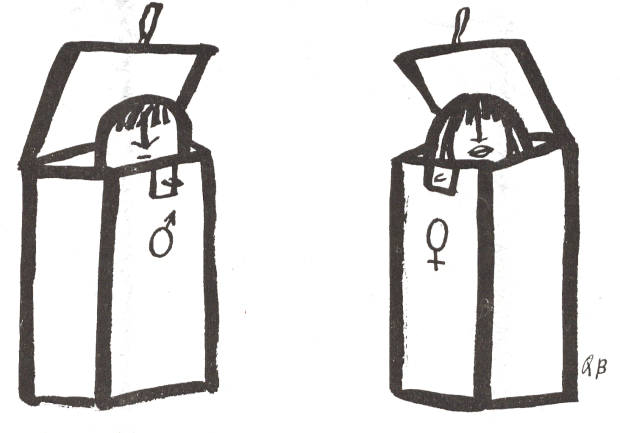Vogue magazine’s recent ‘powerhouse’ of 25 ‘women [who are] defining – and redefining – Britain in 2023’ includes one person who is not like the others. Emily Bridges is no more a woman than I am, but the transgender cyclist is the only sporting figure to have made the cut. What a kick in the teeth to the Lionesses recently returned from Australia.
Increasingly, it seems to me that when we take on gender identity ideology, we are up against a quasi-religious doctrine
We have become all too familiar with the unfolding scandal of male people displacing females in categories they thought were their own. Listening to the nonsense used by activists to justify their assertions that transwomen are somehow women is tiring and dispiriting, but we need to challenge them if we are to push back the tide.
Vogue’s commentary is disingenuous. According to the magazine, ‘the British Cycling Federation banned transgender athletes from the sport.’ But nobody is banning Bridges from cycling. British cycling has gone out of its way to be inclusive – it has an ‘open category’ which anyone can ride in, transgender people included.
But that is not Bridges wants, presumably because it means racing against men. Writing for Vogue, the cyclist announced that, ‘I’m divesting from the sport – I have to.’ But why should Bridges even think that the female category was ever appropriate? Bridges is young, but it’s not only youngsters who mistake fantasy for reality. The truth is the same as it has ever been – there are two sexes and in physical sport one sex has an advantage over the other. That is why British Cycling retains a separate female category. The governing body also maintains separate classes for children – another group at a disadvantage. If male transsexuals feel that transition has hampered their performance, they could campaign for a separate category of their own and not try to impose themselves on another group.
Bridges, however, sees things differently, ‘Trans inclusion in sports has long been a highly contentious issue due to unsubstantiated concerns about transgender women having a physical advantage over cisgender women.’ Taking issue with that statement is like debating with a young-earth creationist who claims the evidence for evolution is inconclusive, and the fossils were left behind by the great flood. Increasingly, it seems to me that when we take on gender identity ideology, we are up against a quasi-religious doctrine.
Of course, male transsexuals have an advantage in physical sport. We are on average bigger, stronger and faster than women, because we are male and women are female. No research that I could possibly envisage would overturn that self-evident truth, and in the meantime the burden of proof is on those who think otherwise.
But they keep trying. Bridges cited a report by the Canadian Centre for Ethics in Sport that according to Bridges, found that ‘biomedical factors, such as bone density and lung size, do not pose an advantage for trans athletes, but that social factors – like nutrition and training quality – may do.’ Perhaps the message from Emily is that women just need to sort out their diet and training regime and they could take on men?
Unlike most readers, I went digging. The Canadian report is not as clear cut as the piece in Vogue perhaps suggested. The authors kicked off with the assertion that, ‘Biological data are severely limited, and often methodologically flawed’. They then suggested, ‘There is limited evidence regarding the impact of testosterone suppression’.
However, claims of ‘limited and flawed data’ prove nothing. And limited evidence does not mean no evidence. Someone who earnestly believed that the moon was made out of green cheese could point to a ‘limited’ number of lunar landings that might suggest they were wrong.
When the Canadian report complained that ‘Biomedical studies are overvalued in sports policies in comparison to social sciences studies’, I suspected it shouldn’t be taken seriously. But I’m glad I kept reading just to make sure. Next, the report insisted that, ‘“Male” and “female” are not mutually exclusive categories and should not be treated as such’.
This is a report that seems to be based in activism rather than science. And to prove my point, the authors went on to moan that, ‘Cissexism, transphobia, transmisogyny and overlapping systems of oppression need to be recognised and addressed for trans women to participate in elite sport.’
No. Sporting governing bodies – at least those in the UK – are going out of their way to promote trans inclusive policies. But what they are now refusing to do is throw women’s sport under the bus. If Vogue wants to do likewise then they could find a woman athlete to include in their female powerhouse.
Got something to add? Join the discussion and comment below.
Get 10 issues for just $10
Subscribe to The Spectator Australia today for the next 10 magazine issues, plus full online access, for just $10.




















Comments
Don't miss out
Join the conversation with other Spectator Australia readers. Subscribe to leave a comment.
SUBSCRIBEAlready a subscriber? Log in